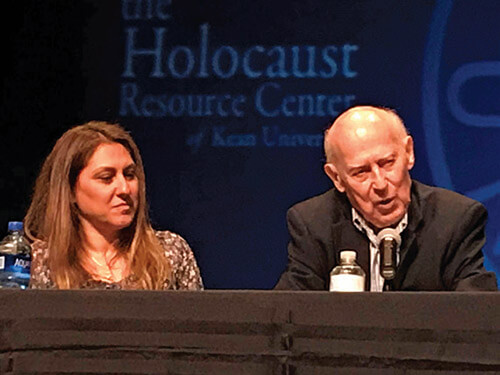



“A Night at the Garden.” Not what you would expect to open a Holocaust remembrance event. Evident almost immediately, the movie generated an instantaneous chill as it became apparent that this was clearly not the portrayal of a pre-war American patriotism rally it was headlined to be. It was nothing short of a hawkish and transparent Nazi pep rally, cloaked in red, white and blue and fraught with Nazi propaganda, right here in our own backyard: Madison Square Garden. The year: 1939.
With this shocking and poignant introduction to the event, the Wilkins Theatre on the campus of Kean University was host once again to a full house for this year’s Holocaust commemoration. The tradition began decades ago as a memorial to those who perished but have no recognized personal yartzeit. In its infant years, the event provided Shoah survivors and their families with an opportunity to join as a community in honoring the memories of those who perished at the inhumane, criminal hands of the Nazis and their collaborators. It also afforded a venue to recite Kaddish, traditionally done only with the presence of a minyan, and soulfully led this year by Rabbi Richard Kirsch of the Rae Kushner Yeshiva High School.
Since then it has developed and expanded into a global community event and a unique opportunity to educate, seized originally by Kean in 1982 when it launched one of the earliest dedicated Holocaust studies programs at an American secular college. Kean University has taken up the higher education mantle as both a staunch guardian and devoted advocate of Holocaust history and education, demonstrated by its trail-blazing and landmark Holocaust Studies Program and Resource Center.
Michael Bornstein lit the first candle representing all Holocaust survivors. Others lighting candles represented second-, third- and fourth-generation survivors; righteous rescuers; World War II veteran liberators and POWs; and Holocaust educators. The last candle was lit by Barbara Wind, recently retired director of the Holocaust Council of Jewish Federation of Greater MetroWest NJ.
The national anthems of Israel and the U.S. were presented by the joint youth choirs of the JEC middle school and Elmora Public School 12, directed by Chana Salamon and Dr. Anna Kroik, respectively.
Rabbi Robert Lichtman, chief Jewish learning officer for Jewish Federation of Greater MetroWest, offered a compelling message gleaned from the legacy of our matriarch and patriarch Sarah and Avraham. Lichtman stated that as a nation, we must seek justice. He went on to relate that one of the lessons from the Torah’s account of the Binding of Isaac is “When you see evil, don’t wait for Me (God) to confront evil.” We must ourselves recognize and respond to evil and remain a righteous nation.
Keynote speaker 96-year-old Robert Max is a Jewish World War II U.S. Army veteran. He is believed to be the last living American soldier to have escaped and survived the Nazi prisoner of war slave labor camp during World War II. He related his amazing story of service, capture, escape and survival following the climactic Battle of the Bulge. Max told stories of the brutal conditions and risks he endured, of being disciplined by the butt of a rifle, building a railway in below zero temperatures with no coat or shoes, and mixed with the good fortune unearthed from amongst the bad. In his book “The Long March Home,” and to the audience, Max detailed the many and unexpected circumstances that allowed him by grace to live to tell these stories, even after his parents had been incorrectly informed by the Army that he was dead.
Max was introduced and joined at the podium by Ilyse Shainbrown, incoming director of Holocaust Education, Holocaust Council of JFGMW. She urged everyone to make a commitment to share Max’s story. In doing so, everyone can help ensure that “never again” remains the motto of our future.
By Ellie Wolf
�













